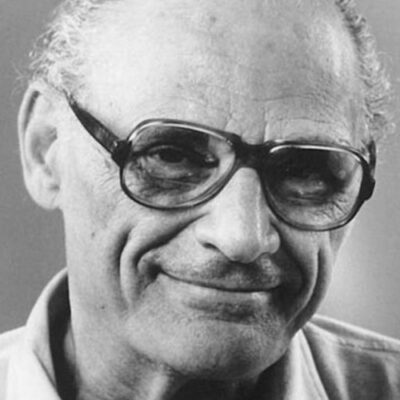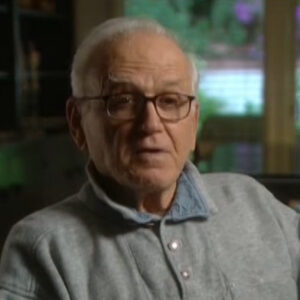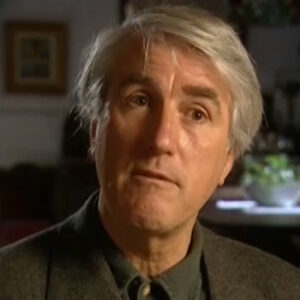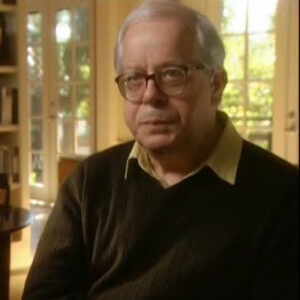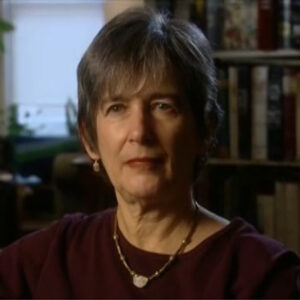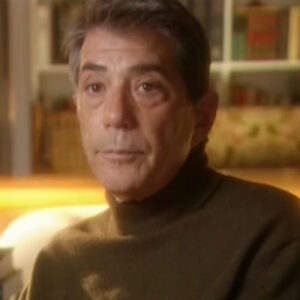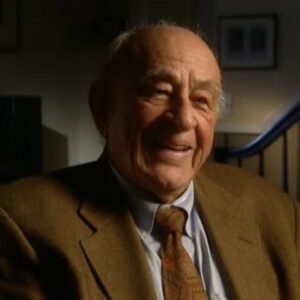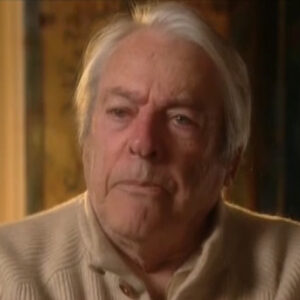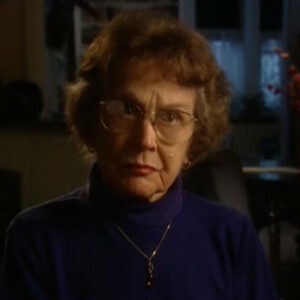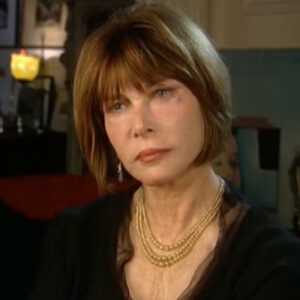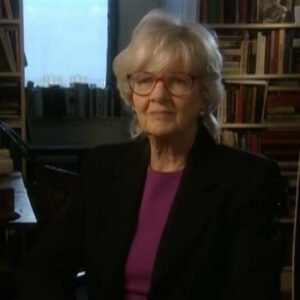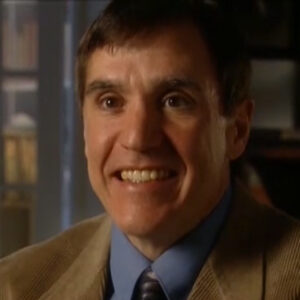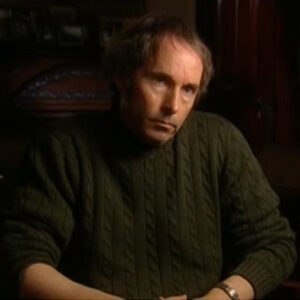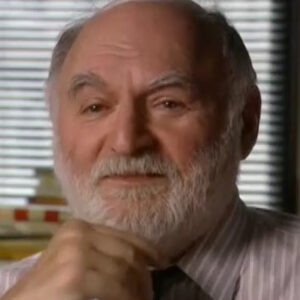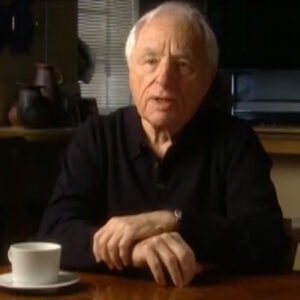Speaker So think back to the early 1950s. I guess you were just recently arrived in New York. Were. Did you know the names Arthur Miller and Elia Kazan? Were they important names? Were they on people’s lives?
Speaker Well, I had seen Death of a Salesman.
Speaker I had been in New York once before. On a visit. And I saw Death of a Salesman. And I was very, very impressed with death, with the death of a salesman.
Speaker I come from Canada. And so I I wasn’t really aware of the ins and outs of what was going on at that time. Certainly politically, I knew nothing about things, but I just I was knocked out by the the actors. I thought they were just absolutely wonderful. You know, Lee Lee, Carl Jay Cobb and Mildred Dunnock, who I subsequently worked with him, Cat on a Hot Tin Roof later, and just an Johnny Kennedy who I worked with in The Crucible. His professional name was Arthur Kennedy. And so, I mean, I didn’t meet them at that time, you know. But then when we started with when I got the audition for The Crucible, it was a very big event for me. Certainly, I had wanted to be an actor all my life. And we call them actresses. Them now was actor.
Speaker I auditioned for Arthur Miller, Kermit Bloomgarden and Jed Harris in Kermit Bloomgarden, the producer’s office. I didn’t know anything at all about his work or Joseph McCarthy or those people at all. I knew nothing about the problems of it. I didn’t know that Kazan was supposed to direct the Crucible and that he was not going to. I was just a naive young person trying to be a big star. Let’s put it that way. And so I auditioned and I received I got the job of Mercy Lewis, a very small part in it, an understudy in. Abigail and we went into rehearsal. I can’t remember what you asked me, but am I following. More or less what we’re gonna get to the group.
Speaker So, yes. Okay.
Speaker Okay. I started rehearsals. Jed Harris was a very formidable looking person. He was very dark. He had very black eyes and black hair. And he had a kind of a sharp kind of face. He looked like my image of Richard. The second night at that time. But later he really did look sort of that way to me. And rehearsals proceeded. And little by little, I heard things about this and that.
Speaker And so once or twice, like Kazan’s name in a hush, as you know. And I thought who? I knew Kazan’s name, but I didn’t know anything about him. And I heard the word Gadge. And I ask somebody who’s Gadge and Gadg, of course, is what he was called for a long time. But then he I think maybe 30 years ago, he said everyone to be called Gadg or Gadget. Again, that was out of the the group theater days. I guess you know why that is. I don’t know. But it was because he was always using gadgets, I guess. I don’t know what. But he started out as an actor, you know. He was a pretty good actor. Apparently, I only saw one movie that he did something about Blue Blue Blues in the night or so. I know that I don’t what it was. I don’t know why I’m talking about. That’s not important anyway.
Speaker Rehearsals got a little bit tense.
Speaker Arthur was around a lot. I’m not sure whether he was there every day. Tennessee Williams was always there when we were doing Cat. Sweet Bird those.
Speaker But Arthur, I do I have this this memory of him being sort of in the background of being this kind of tall, very spare looking man who didn’t talk very much to the actors. Probably he talked a lot, too, to Johnny Kennedy, you know, having worked with him before. But him, they were probably good friends and talked. But he he stayed in the background a lot.
Speaker Then.
Speaker Jed Harris would walk around the orchestra, like down in the house while we were rehearsing and his sibilant whisper would come up. And I for a long time, I wasn’t quite sure whether Jed was actually saying this or not or whether I was just hearing things. He was saying just they’re just there.
Speaker And I thought that was what I was feeling. He should be up there playing up again. One day, were they? They came down the hallway of the hotel.
Speaker This is when we were in Wilmington out of town trial. And there were the three men, Jed Harris, Arthur Miller and Kermit Bloomgarden as they came toward me. I thought, I know what they’re gonna say. I know what they’re going to say. And they did. They sort of surrounded me and they said, we want you to be Abigail. And I said, good. Then those three men sat me. Well, I was sat down at a at a table in the hallway and they put a contract in front of me and a pen and I signed it without reading it, without looking at it.
Speaker I read I was so dumb, but I was I was so excited.
Speaker I was so excited, you know, and I signed this thing and and I went right into the video play. I was the understand knew the lines, but I went in I think that night or the next night was incredible. And then we went to New York, you know, from after three time. But the thing. Well, the reason that I was I was so excited because I got the part. But afterwards, I went to the phone and I telephoned my agent, New York, and I said, Marty. And this man had a lot of big plans for me. He had really big plans that was going to do very well. He was a nice man. He was one of the heads of William Morris at that time, was a very big agent. And he had signed me and I was excited and so on and so forth by that.
Speaker But I said, I’m Abigail.
Speaker He said, Oh, that’s great. I’ll be down right away to negotiate.
Speaker And I said, oh, well, I’ve signed the contract. You said you sign what, what, what, what you get. And I said, Well, I got ten dollars more than I got as the understudy. And he said, oh, no billing. Oh, they didn’t talk about billing, I said. You are a very stupid girl. And he hung up the phone and he dispensed with me as his client. So anyway, that was that was that was just, you know, a personal thing, but.
Speaker Oh, yeah.
Speaker Tell me what you’re saying or I’ll say it to her somewhere else, OK?
Speaker Michael, we’re fine. I just want to make sure the helicopter tested, we weren’t interrupted.
Speaker There’s a helicopter that went overhead making sure. Is it something to do with me? No, no, no, no. Not at all. Oh, I see. Okay.
Speaker I was knocked down. Oh, I see. Yes. All right, fine.
Speaker Of course. Of course I know. No, I thought it was something to do with me. And I’d rather you told me out loud. That’s a.. Fine. Okay. I told you. It takes me a while. Get going.
Speaker Don’t worry. Certainly. As well as. Wait. We’re rolling again. Right.
Speaker Well, you said you told me last night that your favorite role you ever played was that of Abigail. Yeah. Tell me, what was it about that role that.
Speaker So much. It’s very difficult to.
Speaker It’s difficult to separate how I felt about Abigail then and and how I and how I felt about myself then and how I now feel about myself and Abigail. And you see, I.
Speaker I know from my training at Actors Studio with Lee Strasberg that a person, an actor has to find the core of a role within themselves. You don’t become another character, but you you have to find something about the character that is part of you and something that is good about you, something positive about you, and that I didn’t know that then. But that’s exactly what I found for Abigail. I had to find something that where Abigail was a good person. And now in my later years and having gone through a lot of stuff myself, and particularly the women’s movement and in the 70s in New York with consciousness raising and so on and so forth, you know, I mean, I used to really believe that stuff, that tall, dark men were really like gods.
Speaker You know, Arthur Miller fit that pretty well. But the thing I was getting to the point.
Speaker The point is that.
Speaker I don’t think that Abigail was a bad person. I think she was a good person. I think she was in the place, she said. They say she’s 17, but the real Abigail was only 14. And I think that she was just she was living in Reverend Paris’s house. She was this is what she wasn’t living there. She was a servant of the proctors. But John. John Kennedy and the interest rate.
Speaker But she. Oh, goodness, are mixed up now.
Speaker Abigail, what kind of what was her what kind of role did she have in the drama?
Speaker Well, she was the catalyst that started all the witchcraft. Thank you. You got me back on the right track. She was. To most people, she was the the evil person.
Speaker But I think she was a very bright young woman who was bored with life, where she was living. And I think her her opportunities were very negligible there, too, to show her talent, you know. And she she took her her friends, the other servant girls with Tituba, the slave woman. Out to the woods. And they danced and apparently danced naked, some or all. And then she slowly but surely I feel, because I think they’ve been dancing for ages out there long before anybody found them, you know.
Speaker And then they they started to talk about witchcraft. But I mean, she did. She started instill that into their heads. But I think that probably came after John Proctor rejected her. And she had you know, people will say she she was. She of Abigail was. Seducing John Proctor? Well, she was a young woman, Abigail. John Proctor was married, had children. I think that he lusted after her and had her lay with her, as they used to say in Bible times, and in that time, 16 hundreds. And then when he rejected her out of his own enormous guilt about doing what he did and when he had that lovely wife back home there and she knew what had happened. And then, you know, it was well. Abigail wanted revenge and she got it. She got it by. Turning the whole town on to which.
Speaker Witchcraft, a witch hunt, a witch hunt and saying that she had all the girls saying that they they were being bedevilled literally by the. The upstanding members of the community. Right. Especially Elizabeth Proctor. By sticking pins in a puppet. And that was hurting the girls. They were blood was coming out of them and. And they weren’t menstruating. It was coming out of their head or their arms or whatever, you know, and they were they were bleeding and and all sorts of things were happening. And so they brought in the clerics. They brought in the clergy. They brought in the the pollet politicians, the judge and so on. Certainly had the trials and they tried these innocent people. I mean, innocent of witchcraft. I mean, in those days, witchcraft was a very big thing. Right. Witches and. And it was God and the devil. And you were either for one and against the other or you were for the for God and you were against the devil. So it was a very restricted time, certainly in the Puritan time.
Speaker And how did that relate to what was going on in the States in the 50s?
Speaker Yes or no? Yeah.
Speaker So to just step back just a little bit in Miller’s drama and the drama of The Crucible. Yeah. What is it that precipitated the hysteria? I don’t understand those the the events in the Crucible lead up to hysterical behavior of the girls. Exactly. And what is it that precipitated that?
Speaker Well, I, I think it’s you know, you got to talk to to your your scholars about the. This kind of thing. I can only talk about it through that point of view of Abigail is what I’m saying, you know. And she wanted to get revenge for her rejection being rejected. And in order to do that, she invented this. Thing of of of having the witches and the witches were the people who were the the townspeople in those times. If if they were suspected of being witches in the town, they immediately brought in people to judge them, first of all, they questioned them. Reverend Hale questioned them very, very much. You know, the the Elizabeth Proctor and good in person all all the characters, they’re mostly women, but some men, too. And so that must have precipitated, I presume, the hysterical, because they they asked the girls to come in to the courtroom when they were being tried.
Speaker And Abigail would say, look, look, look, look. And and they’d start screaming and she’d say, isn’t that though? Isn’t that the one who was was attacking you with the puppet?
Speaker She put the puppet in. Yes. And you were you and you got to. And you fainted. You fainted. Remember Mary. And you fainted.
Speaker And then when things are going a little bit tougher for Abigail, you know, when Abigail was being questioned. Ah, you were certain that you that you that you and the girls saw these witches and so on, so forth, she would go into another one over her things.
Speaker Help. Help me see John Proctor, the character help you would see. See, and Oprah. Is he a good man? Is he a man without any flaws?
Speaker Who is your title?
Speaker John Proctor was considered a good man in the community. I believe. Whether he considered himself a good man, I’m not sure after having.
Speaker Perhaps raped. Abigail. We probably would call it date rape. Today. Not saying that she didn’t want it, but, you know. But I don’t know whether she did or not. I think that Tim.
Speaker I think he was a coward.
Speaker Now, I think he was a coward. I didn’t think so when I was doing the play.
Speaker It’s so people are so quick or were then and perhaps still are, but they were so quick to always lay the blame on the woman, on the girl. And they didn’t. They felt they would say that. I’m saying they. But, I mean, this was the the the the newspaper articles and so on and so forth. You were written about it. You know, when people when they talked about it, they say, oh, she was such a devil. She was such a mischief maker. She was so bad. But they don’t say anything bad about him, about John Proctor.
Speaker And I think there was equal. Parts there. And I do I do believe that John Proctor.
Speaker Arthur Miller. Were.
Speaker Not human, but not perfect human beings any more than Kazan was a perfect human being. Or I am a perfect human being. But he wrote about a man who. Ultimately went to his death trying to protect his wife. I think Arthur Miller is a wonderful writer. I think he writes better for men than for women.
Speaker I do. Can you talk a little bit about the public drama of The Crucible? Is the hysteria of the witch hunt? But there’s perhaps an even more important private drama going on in the had. In the propter home, in the Propter?
Speaker Well, yes, because Elizabeth, you mean knew that this was going on and she refused to play with a. With John Thomas struggling, yeah, with his whole. Well, that’s when he rejected Abigail, isn’t it? What what do you with he struggled with confessing that he had done this. That he had been with Abigail and it was a tremendous confession, very difficult to confess. Certainly. And when someone is living with a woman as wife and has children and they’re having an affair with someone else who is living in the same house, in a sense, that’s heavy duty. And I rather imagine that Arthur Miller was dealing with somewhat the same. Agony around that time. The same guilt, perhaps. And I’m not saying that. I’ve said before. Arthur Miller is a very fine writer. But to be a fine writer doesn’t necessarily mean you’re. Not Tim.
Speaker Not just not a perfect man, but that you’re not in in a relationship yourself. That is dicey. That is not very good. I mean, it may be very good, but it’s it’s causing problems in your home, in your real home outside of.
Speaker The play you’re doing, and I find it difficult to. To say too much negative about Arthur. I mean, I’m not trying to point a finger at him because. I keep on going back to the title of the documentary that we’re doing. And can I say the title Nun Without Sin? And I believe that very firmly. I feel it for myself. I feel it. Everyone in life, but sometimes public people, especially in the entertainment business, it’s very difficult to keep your private life private. I think he managed to do that quite well for quite a while.
Speaker And then it all came out and.
Speaker And then there were the. There are our own 50s, which witch hunt? The witch hunt of the New York committee and the yes, Joe McCarthy and so on and so forth with Ginge teams overall is a simple.
Speaker Please help me see Arthur Miller. Is he a boisterous wow?
Speaker No, is not Arthur Miller is not boisterous and loud. Unless in the intervening years he has become so. But I doubt it. He’s very quiet.
Speaker He talks very little to the actors or he did talk. You know, in The Crucible. I didn’t know very much about any of them because I was new in New York when I got Abigail. But Arthur would stay in the background. He would speak. He would very polite. He was very gentlemanly. He would, of course, say good morning and goodbye. And so on and so forth, you know. But there were very few pleasantries, really. And never talked about the play. But that was not unusual because the playwright is there’s an unwritten law that says the playwright, when he’s good, wants to complain.
Speaker Talks to the director and the director talks to the actor and vice versa. If the director if the actor wants, she talks to the director and then to the playwright, you know, so that that’s the way it goes.
Speaker How would you how would you describe Arthur physically? Say, you know, the tall oak. Sorry, Hawkins. Sorry. Let’s assume there are no photographs.
Speaker For a moment. And you have to verbally paint a picture for me of the man.
Speaker I’m looking at him. OK? He’s very tall and I’m looking at him up there. He’s very far up from me. And he has very broad shoulders.
Speaker He had had had dark hair, as I seem to remember. He has wide lips. I mean, wide mouth. Not nice. No, not wide lips, but wide mouth. And he wore very kind of easy going clothes. And in those days, people didn’t wear, you know, chino pants and all of that kind of thing, t shirts and things. He wore sort of I can’t remember exactly, but I think he wore a tie, a suit and tie and. And he had a soft voice. And it was very straight. That’s what I remember about. Very straight, very straight shoulders, feet and looking down at me.
Speaker Somebody described him as weakness.
Speaker Oh yeah, I. I guess that’s what I’m talking about. Right. The shoulders and the tall man. And without the beard and the mole, he can have more. Yeah. These very little Lincolnesque. And I think that he will go and I think that he had an aura about him that said, I am a person who cares about people.
Speaker And I think this is reflected in his writing.
Speaker You know, you’re one of the few people that we’re gonna get a chance to talk to. Who knew both men in the theater, huh?
Speaker Both men. You mean because they are. Yes. Because. Help me see. Were they the same? How were you?
Speaker Is same the same, what do you mean?
Speaker Well, you talk about Miller is aloof and and Lincolnesque, statuesque. Did Cause and Miller interact with the actors, the stage, the theater with? Because at one point they were very, very close friends. And I want to know.
Speaker They were not the same at all in personality. Is that what you meant?
Speaker What was what were their differences as you saw?
Speaker Well, I said Arthur Miller is very tall and he’s very well, you statuesque, Lincolnesque, whatever. Elia Kazan is short, very short, very wiry. Very, very quick, fast. Arthur walk very slowly sedately. And Kazan was always kind of.
Speaker You always had a feeling he was like a spring, you know, all kind of tight spring like that. In any moment he could fly apart. But he was very gentle with actors, extremely gentle with actors. And as a matter of fact, he had the ability when I was doing Cat in a Hot Tin Roof and with Sweet Bird of youth to make every single actor. I assume he was like that in everything that he directed to make every actor feel as so. I am the most important part of this play. Whether you had two lines or whether you had the leading role, he would find a way to make you feel very important.
Speaker Perfect. That was beautiful. It was OK. Thank you. Because beautiful.
Speaker You know, you’re not the only person who spoke with Kim Hunter. Yes, I know very much the same thing.
Speaker What is it about Kisan that makes him so unique? Did you get because you didn’t get that feeling every time you went in front of a director? That’s Gardner.
Speaker I worked with some very, very good directors, actually, but. But Kazan was the best director I ever, ever worked with. And after I knew a little bit more about it, about him as a man, I had trouble sometimes that way, you know. But but he as a director, he was superb. Absolutely superb. I don’t know what it was. I can’t tell you what it was, what that special thing was. If I knew it.
Speaker I’d steal it. I’d use it.
Speaker But if you. If we can sort of find it. Exactly. No, no, no. This was great. If we can’t quite find it impersonally, help me understand the process, how he went direct.
Speaker OK. He would he would take an actor if there was something that was that obviously that wasn’t going right for him, you know, about something he’d walk over to. He was very short, you know, and he’d put his arm around your shoulder. Now, we were fairly even, but I think I was even an almost little taller. I can’t remember now. But he would put his arm around the guy, you know, and he’d have to do it this way because it was short. But then you take it just kind of walk away with you. And out of the scene. And he’d be talking very, very quietly and he would go through it with you very know like.
Speaker Be very intimate. Don’t worry about it. It’s OK. Everything’s fine. And then he’d give you a slight suggestion of some kind, like maybe a.
Speaker You were out last night the whole night for drinking whole time, right? OK, go ahead. All right, let’s start.
Speaker That’s all you do, you know, and the person that the actor would I mean, he was he was talking about the character, you know, the character in the play perhaps had been drinking. I mean, he gave in. There’s nothing to suggest that he had been. But it was Kazan saying it. And that’s part of what we learn.
Speaker There seems to me that then has a special insight not only into the character, but into his actors.
Speaker Yeah, very much so. Excuse me, please.
Speaker Please pardon me. The word he had.
Speaker And speaking of witchcraft, I think that he was somewhat of a witch himself in terms of being able to touch that that Achilles heel or that that moment of that was going to get. There is a little story that I can remember when when we did Sweet Bird of Youth, Paul Newman played. Brooke. I mean, chance, weigh in. Pardon me, Brooke, as well, you played Brooke in them in the movie. Yes. Right. So did we both know. So when do we when he was doing chance, weighing in on the play in the play version, Tennessee. And we were in rehearsal.
Speaker Kazan felt apparently that. Paul was too confident.
Speaker Because he was a big, big movie star at that point and he was trying to unsettle. Paul to get them off balance, and he began giving vocal verbal praise to Geraldine Pré page, to Geraldine Prate, Geraldine Page and even give any to Paul.
Speaker That’s sneaky, but good.
Speaker I ask you to go back to this idea because I love this idea. This is just great. This idea that he’s a bit of a witch, there’s a little devil.
Speaker Yeah. Oh, definitely. And I think it gives me about that. I don’t know why it is, except that I know that he was born in Greece. I mean, he was Greek and he was born in Turkey. And he had an upbringing. I mean, he lived in times with it, which were real tough, you know. And he had to learn to be skillful.
Speaker You know, the idea that I think I want to try to get at is that, you know, Kim Hunter share that same thought that he would get you to expose a vulnerability. Can you talk to your Hugh? He knew.
Speaker Well, that that’s what I’m talking about with Paul. You know, because a for yourself or for you see, because I can so I can remove it from Paul Newman because a little bit beyond arrest, right? Oh, I see. To me, if we can talk about it just generally and.
Speaker Well, it’s difficult to.
Speaker It’s difficult to to pinpoint it because what he did was talk to you usually quietly, and he never. Well, the one thing in Sweet Bird of Youth with me was when I was playing Miss Lucy on stage, I had a a walk down the flight of steps from my first entrance to the bar. And pardon me when I did it the first time in rehearsal. That scene, I walked down and I walked right down to the front of the stage and I went.
Speaker And he loved that, but he didn’t tell me right away very, you know, because I played that it was a mirror out front, you know.
Speaker And then I turned up and went back up to the to the bar and talked to the bar, the bar men and stuff.
Speaker And it was just something that I tried out. No. And then he stopped. Then he started talking about it when the scenes were going on. He was he was out in the house and he would say, oh, Miss Lucy really has got it right. Right. How about a little more that Miss Lucy, which was my name in the show. And he laughed. Then every time I came on and did that and he gave me a great sense that I had, you know, done something really terrific in that scene because Miss Lucy is very, very sure of herself. She’s being kept by the boss and so on, so forth. And she’s the only one in the play, you know, that is on Paul’s chance way inside.
Speaker I ask you this question. People talk to us all sorts of kinds of people. People who interviewed kids and people who worked with kids. Yeah. Is the most seductive man I had ever met. Yeah, that’s right.
Speaker Why didn’t I. Didn’t I use that term? I used to. I said, what did I say? It was I said he was a witch. Not quite the same thing. Was he seductive. Very seductive. Very seductive. He could. He could really charm you into. I said it earlier. Into believing that you were the most important thing in the production. The import most important person in the production. And that was that’s I mean, it’s very hard to do that with somebody who has six lines, probably. You know, it’s a real tough.
Speaker You wanted to thing with. Did you know Kisan ever to be a womanizer? Was that ever? Sort of gossip on the stage, people. He’s so candid about it in his own book.
Speaker Yeah. He was. He was he was a womanizer. Yeah.
Speaker I I remember one time I was at the back of the house. They were rehearsing or something. And he came over to me, took me by the shoulders. It doesn’t mean anything today that I just realized because everybody does that. But he took him by the shoulders and he went and he stuck his tongue right in my mouth.
Speaker And I mean, there was no there was no foreplay. Nothing led up to it. You know, and I was so startled. I was so startled. And then I thought, what is this anyway? But I’m saying that that’s what people do all the time.
Speaker You see them marching around like crazy on television and everything else, you know? And I think it’s a I don’t know. I think it’s nice to start out a little slower somehow or other. But then there was a time when when he was we went to the movies. Hildy Brauner and myself went to movies with him at Two Wild Strawberries. Ingrid Bergman thing. And there we were. And I didn’t understand that movie at that time. And before I knew it, he had a hand on each of us. Hilda on one side, me on the other. I shouldn’t have said her name. But anyway, she’s changed her name now, so. And he was, you know.
Speaker One on one side and one on the other side. I mean, and yet one had a choice, you could either go with it or you could say, stop it. And I think I stayed with it for a short time, at which point I took his hand and I kissed it and put it down.
Speaker Do people love your grades? I just want to read it. What was their love for everybody? I just want to give everybody a chance to breathe. I think I’m holding their breath.
Speaker He was. Yeah. Wait, when did. Kim. Tim didn’t talk about her relationship. That she didn’t. She was very circumspect.
Speaker And, you know, he he he’s very candid about the fact that you you. Sex mattered to him. He was a great’s.
Speaker Great seducer not and I don’t think they had a term for that in the olden days, a six something that was called a nymphomaniac, right?
Speaker No, no, that’s a woman. Right. Maniac or whatever.
Speaker No, no, this swordsmen, great swordsman or something. Something like that, right. You know, sword negation need to be told what that meant.
Speaker Well, let me ask you this question. Is this this great moment he comes up in?
Speaker I think he was compensating for his size. For his tallness, a short shortness.
Speaker Pardon me, where he talks, you know, there’s a sense that he always thought he was awkward and that he was not attractive enough.
Speaker That’s right. I think he felt very ugly. He did. He told me he felt ugly.
Speaker And he told me that Barbara was the only person that ever. Gave him the feeling that he was not ugly. So.
Speaker Let if we can shift to the crucible. Yes. In the play, the girls have gone out. They’ve danced. And Abigail has asked for an evil spell to be cast upon Elizabeth Project. Why?
Speaker Because John Proctor rejected her, he. They had had a they had had sex and. And then he rejected her. He wouldn’t be with her anymore, and she wanted to be she wanted to get rid of Elizabeth actually speaking. She really wanted to get rid of him her and marry John Proctor. And John Proctor was full full of guilt, certainly. But he. Was afraid to continue with Abigail because his wife knew what was going on. Elizabeth Proctor and had turned Abigail out of the house. She was their servant and had gotten rid of her. But then she also had rejected John herself and would not sleep with him.
Speaker So the girls get caught out in the woods. Reverend Paris, I think I forget, exactly comes and sees Davis this.
Speaker Yeah, see somebody naked. We were with Tituba, right? The slave woman.
Speaker So if I can if you remember, we can stop. If you don’t, we can look at the play. But at the end of the first act. There’s all of this rumbling now and the girls are starting to worry and they’re catatonic, almost one of them is politely laid out.
Speaker Mary Yeah. Yeah, exactly.
Speaker Can you describe for me the drama? If I’m in the theater the panic that the girls are feeling, and how do they find their way out of the out of the sense that they’re going to.
Speaker Be punished.
Speaker Why the panic for what they did, you mean? Yeah. How do they get out? How do they get out?
Speaker Bye bye, Abigail.
Speaker If I can OK, just explain the panic and help me see how they escaped the panic.
Speaker Why are they so scared? What are they afraid of?
Speaker They’re afraid they’re going to go to hell. For dancing and and. And doing what they did in the in the woods, which is very much the devil’s work. And so they are afraid that they’re going to be punished, probably maybe even killed, because if they are accused of being witches. They might get hung or or.
Speaker So they.
Speaker They were. And.
Speaker It was Abagail who.
Speaker Convinced them. That they were seeing. Which is. That Elizabeth Propter was a witch.
Speaker And you start naming names, don’t you? Yes.
Speaker You start doing what? What do you start doing in the play? I don’t know.
Speaker I don’t know. You start deflecting right away, why that you start deflecting responsibility onto other people? What happens at the end of the play? One of the girls starts screaming.
Speaker I’m black. I don’t know what to say.
Speaker Well, the girls start to scream. It wasn’t me that consorted with the devil.
Speaker Oh, I see what you mean. You want to take a break? No. We in the play, we. Abigail orchestrates. Abigail is Ilya Kazam. The person who can can give people a feeling that she can really direct the girls to do whatever she wanted, and she wanted the girls to accuse the people in the towns, especially Elizabeth, so that they would not be blamed for what went on in the in the woods and they would be absolved of sin. And that sin would go on to the other two, to Elizabeth and all the other people in the town. Rebecca, Rebecca nurse. I can’t think of his name. Corey, you know the man.
Speaker Do you blame other people and then you’re free, right?
Speaker Yes. If you blame other people, then you can be. Accepted again in the community. And you will not be blamed.
Speaker Beautiful. Perfect. Thank you.
Speaker Rachel is a very bold, daring piece of work because it’s not really, really about a witch hunt, is it? No.
Speaker Were you all aware while you were in production and while you were even maybe on Broadway? Of what was going on in the country and what you were a part of on stage. Was there a sense?
Speaker Of.
Speaker I don’t know, commenting or fighting or, you know, being a part of something bold.
Speaker I was less conscious of this probably than some of the other members of the cast. Particularly author John Kennedy. Beatrice, straight people who knew Kazan, who knew Miller much better than I did and knew the political situation. And in the United States and what the play was reflecting back at when the play in 16 hundreds. I did begin to get glimpses of it, glimpses of of people kind of talking about it. I wonder how we’re going to fare with the critics, for instance. I wonder how they’re going to take it. Whether will. It may not be a big success. The writing we knew was wonderful, but. Not sure. You know, I have no clue.
Speaker Yeah, why? Go ahead. Excuse me. Just from a Polly. That sense of risk that any of you share.
Speaker I think we increasingly shared it as we rehearsed. And then after that, we also shared one share or risk. Risk was implicit in the in the material for many people. I didn’t understand it at first at all. I was too naive newly in the United States unions. But as we went along, there was talk about I would hear a couple of remarks from perhaps from Johnny didn’t Arthur Kennedy didn’t speak about it very much. But some feel Coolidge, e.g., Marshall Wood. They talked a lot together. And there was a sense that I wonder what’s going to happen when the critics see us. I wonder how they’re going to treat this play. Well, it’s about witchcraft in the sixteen hundreds, presumably. But here we are in the middle of the huge arc. Well, it was beginning to become the Joe McCarthy. I don’t know when they intersected, but the committee you are being the House un-American Activities Committee and people were being blacklisted from the entertainment business and probably from other professions and businesses too, but particularly in the entertainment, which was so upfront, you know, when once we were open and the critics were so careful. Only Brooks Atkinson gave us a relatively good review. Many, many of them read. They dismissed the play. I mean, I can’t remember exactly what it was, but I mean, how how they said it. But in essence, that. Arthur Miller had tried to recreate something here that didn’t really work very well. Not a mention, not one single connection between sixteen hundred and the 1950s. Why? Maybe they were afraid of their jobs. Newspapermen were getting blacklisted, too, if they got a cue. If you got into red channels or aware those magazines that came out once a week or once a month or whatever it was, they had these columns, you know. That said, a fellow traveler pinko, a known communist. So sometimes you got into what I know that eventually I was in the fellow traveller one when I was blacklisted later.
Speaker I was never brought up on the two.
Speaker I’m going to hold off on that so that I can get you to tell me that story. But it’s beautiful. You’ve done a great job of describing the atmosphere in which the Crucible was presented to the public. And you can do a wonderful job. I don’t need you to do it again about the newspapers. OK. Do you have a successful Broadway run? No, it’s an Arthur Miller play, everybody knows it. Now, we all read it in school.
Speaker I know. Oh, do you know that? Boy, you probably heard this before, that the crucible is performed every day of every year somewhere in the world. It is that and the as the schoolchildren learn it and learn lessons from it about the sixteen hundreds and the 50 in the 1950s. Now I’ve lost my track. So when you opened on Broadway, when you opened on Broadway, the critics were not. Positivity, all about the play. And we ran for, I think not more than about four months, maybe five. But that’s the most five months. And that’s not a hit play, you know. And I think that I don’t know whether Arthur Miller was surprised or not and whether Kazan was surprised or not, but they presented it or hit it cannot. Kazan commanded and direct it, I’m sure. Yeah, you’d have restricted it. I don’t know. You know. But but there were my Brooks Atkinson gave the play a good review and related it to what was going on at the time. In the fifties. In the 50s. You touched on it. He didn’t go into great detail about it, most certainly because it was the height of it. You know, there was no. There was no leeway to be one thing or the other. You had to be either absolutely very politely against communism or anything. That’s it. That smacked of being leftist of any sort. A tall or you had to be a communist and a left wing person. And in between, there was nothing there was no gradation. It’s impossible to understand how difficult those times were for everybody. I think it was difficult for you whether you were whether you were left or right, in a sense, you know, to know. Do you know that people, your friends, when you were walking down Broadway or Seventh Avenue or one of the side, the theater streets?
Speaker Your friends would cross the street so that they would not have to say hello to you and be seen saying hello to you and associating with by just saying hello. Did you know if you hadn’t heard that somebody was a communist? That’s that. No. You knew might be accused of being a fellow traveler because you were talking to somebody who had already been accused of being a communist or they were thought to be a fellow traveler or whatever. And so literally speaking, you would see somebody, a friend. You knew it was a friend. And it got to be so embarrassing. It was so sad and embarrassing. And it was a case of either you had to cross the street or they had to cross the street. And if you were brave enough, you walk to see if maybe they’d be brave enough to walk and talk to you. But very often they would cross the street. Very good people that just couldn’t face the fact that they might lose their livelihood, their families, their, you know, their their dignity, because that’s what they’ve robbed you of. And they the committee the committee people committed suicide, you know.
Speaker Yeah, I know. I have to say personally, I’ve tried over the course of this project to put myself here. And you really can’t because I know. No, what what what life would be like a chasm like that in front of you. But I want to ask you a question about The Crucible, because.
Speaker I have something I want to say. OK, OK, but I’ll get out of the way. No one knows. One would do if one was in that position, if one was called up before the committee.
Speaker Are you communist? You say no or whatever you say. Nobody knows what one would say, whether one would name names of friends, of people who you knew for a long time.
Speaker And you name them as being a communist and.
Speaker I know what I would like to believe that I would say or do, I would like to say what Arthur Miller said, nothing. He refused to cooperate. But I don’t know unless I was in that position. And I and people who like, for instance, the people at the Academy Awards, you know, they were. They had a point when Kazan was honored. Of course they had a point. But I guess I’ve lived long enough that by now when I see them like this with their arms like this, I was sitting there looking at it on my television and saying.
Speaker You don’t know what you would have done. You’re saying holier than thou, you’re playing God. You don’t know what you would have done.
Speaker And Kazan had just signed a million dollar contract to sign it into two directs, three films. How do we know what we would do if we were not in that position? We don’t. And it doesn’t excuse Kazan. But also, it is very difficult now for me to judge people about many things, and I would learn that as you grow older, I suppose.
Speaker I think that that’s perfectly set. It’s impossible. It’s easy to judge because it makes you feel better about your. Yes, it does. It doesn’t change the situation at all. But, boy, you feel a lot better when you point a finger at some.
Speaker Oh, absolutely. You know, I want to ask you if I can pull you back. Just Fantas. Do you know that? You know that. Oh, you know, I, I mean, it was OK that I told you I want to say is that you don’t want to say it. Yeah. Then what I thought of it, you know.
Speaker But I want to touch on this one idea before I lose my my. Oh. Sure. The Crucible. You paint this beautiful picture of it not doing very well. Of critics being afraid of Brooke Atkinson touching upon it. Not dwelling on it in the same way that we do now. And you do a beautiful job of letting me know about all the fear of being labeled a communist or a fellow traveler. But the play is not really about a criticism of communism. It’s a it’s a criticism of the committee. Was it okay to criticize the committee?
Speaker I mean, it’s not a real crime. It seems to me that the real crime of the Crucible is that it criticizes the committee. Is that allowed?
Speaker Yeah. No, it’s not allowed. You’re not allowed to to to criticize a judge. All right. And that’s what they were doing in the Crucible. And that’s what the committee did. The committee the committee judged people without. Do cause.
Speaker And it’s exactly what you talk about in in in after a SAG, right? I mean, the idea here is and I’m trying to get out, maybe I’m not being far up and. Oh, my fault. It’s my fault. It is that. You know, you’re standing up and saying you the committee in the crucible, are not valid. And you’re standing up, right? I mean, know it happens to you when you say this is not fair. Tell me what happened to you. What did you do and what happened?
Speaker I was in a union meeting the first time I had ever gone to a union meeting, actually speaking. And. They were I can’t remember how it went, but there were talk about people who had been newly named. And. By the committee and I stood up and said I didn’t even know this person, they were talking about who? Well, I don’t like to say their name, but we interviewed. Did we?
Speaker Oh, yes. Lee. Lee. So tell me the story. Because we we fast as we sat down with us, it will be nice to. You. Okay. Just start again. You got a union meeting for the first time.
Speaker I went to a union meeting for the first time and they were talking about people who had been blacklisted and so on. I mean, the the what he calls people on the committee on the shoot. I’m sorry. I’ve got to start again. What are you looking for? The council. The council members know they’re sitting up front, you know, and we the members are down over there.
Speaker Okay. I’m interrupting you. I must sit down and shut up and get out of your way. Start over again. Because I want to watch.
Speaker One day I decided to go to a union meeting and I think it was after. And American Federation of Television radio was. And they were along with SAG, but after particularly were the ones who were the most vociferous about naming people as communists and getting rid of them, or they would then if they if the producer didn’t get rid of somebody, they would pull their advertising and that way that the program went down the drain. Right. So they’re they’re talking about what we can do to support the committee. That’s what the council members were talking about. What can we do to support the committee? More. More we have to do more. And with the loyalty oath. We they were putting this loyalty oath into effect so that if you did any kind of show, you had to sign a loyalty saying you were loyal to the United States of America. You were not have you now and have never been a communist. Right. Not now. Never have been. And.
Speaker I stood up and said. I think it’s unfair to do this. I don’t think we should talk about people who have no, like I said, this person. I want. You can use your name. Lee Grant, we know, is a wonderful actor. It is unfair. For us to aid the committee. To blacklist somebody like like a good actress, likely Gren. We should be interested in our. They should be immersed in our talent, not what our political.
Speaker And anyway, I don’t think that. And I felt somebody pulling on my arm. And they pulled me down and sat me on my chair. And there was a person beside me and the person said, Are you crazy?
Speaker You are nuts. Shut up.
Speaker You want to be in red channels.
Speaker The next week I was.
Speaker So whatever happened at that meeting, whatever I said, was enough. To have those people report me or there was a spy or whatever you want to call it, a person from the committee or from whoever they sent who came to these meetings and sat there to hear what we were saying at union meetings.
Speaker And what happened to you after rechannel what happened to you after you found your name out in red channels?
Speaker I never did another radio show. I had been doing. That was early enough. They were still doing radio soap operas. And that was how I was making my living at that point a little bit. You know, that was before The Crucible. You know, that was before The Crucible was back in 1952, 51, something like that. So that I was blacklisted from that. And and and television. But television was, you know, not so much then. That is now, obviously. And then after when I got into the Crucible, I had learned a little bit more about this situation. And so I was beginning to be a little more circumspect about what I talked about. There again.
Speaker Did you ever get out? How did you get your name cleared?
Speaker Well, I never was called up by the committee. That’s why I said earlier that one doesn’t know what one would do if I was called up before the committee. Now, I don’t know whether that was because I was just too small potatoes at that point. I wasn’t important enough. I didn’t care enough. I don’t know. I wasn’t an American citizen. Maybe they’d let it go because of that. I had a green card, you know, but they didn’t take my green card away. I was afraid I was gonna be deported or something. But for a while. But they just let it drop. And eventually I started working again.
Speaker So there was that, you know.
Speaker Now, it’s interesting, you know, we talked quite eloquently about having found herself on red channels and being blacklisted, and they want her to name her husband.
Speaker I know. You know, devastating.
Speaker And they wanted him. They wanted him named. But she was up before the committee. She went before the committee or the KIA refused. And then even in 64 and after he was dead, they wanted her to say, I’m going to ask you if you can’t just for my own entity, I don’t. You do a beautiful job of describing what happened. All I would ask if you could for me is just place the scene again and why you stood up. What was being talked about at that meeting? That that’s all.
Speaker What kind of a meeting was it?
Speaker Well, all union meetings are about what’s going on, obviously in the union, you know, and what’s whether there are more shows coming up, whether there’s more.
Speaker I’m sorry, I have to.
Speaker Please go take what you want to do. All the stuff that we went through.
Speaker Yeah. Yeah, exactly. And they were talking and then mentioning that they were caught, that they were talking about league. Right. That’s all.
Speaker I went to my first union meeting. It was after I think. And they were talking about people who had been blacklisted around the group. And then they started to talk about Lee Grant.
Speaker And. I stood up. Why were they talking about the grand?
Speaker Why what why were they talking about Lee Grant?
Speaker Because she had really had been recently blacklisted. Or she was named she was in red channels. And after that, I think it was an she had to go up before the committee. But she was in red channels and. Said we were saying something about Lee that we have to disassociate ourselves or something like that. You know, I’m talking about the the. Not the committee, but counsel. Counsel, thank you. Talking about the counsel. Pardon me. No, no, no. Counsel was talking about Lee Grant and I. I don’t know why exactly, but I just popped up. I stood up. I said, I don’t understand why this is happening to Lee Grant, to other people. But Lee is such a wonderful actress and we should be talking and thinking about. Oh, I don’t know.
Speaker That’s right. We got. You said you had the. We got it. We got it.
Speaker We’re done. So we don’t have the camera, man. What’s wrong? Maybe it’s out there. That’s the problem. Right.
Speaker So this is during a during performance performance on Broadway. Mm hmm. Hmm hmm. What happened?
Speaker We were doing the first scene with the Reverend Paris and myself and Betty, his daughter and stuff.
Speaker And we were all very nervous. I mean, not about the play, but we were in a state of high nerves and looking over to the side. I suddenly to the wings stage left.
Speaker I saw Arthur. He’s a tall, imposing figure. And he was going like this.
Speaker And just.
Speaker Sugars go through my body right now. We knew that the last appeal had lost and that the Rosenbergs had been executed. And two little boys were without a mother and a father executed, of course, as communist spies. That was the ex Dig’s. How devastating the political climate was at that time. For her, you know what, the hysteria, the hysteria in the country was unbelievably. Now, when you look back on it, you wonder, how were people so duped into feeling that communism was a threat to the United States? Of course.
Speaker I suppose big business, whatever it is, you know, that does this, but at the time, people really felt they really believed that it was a tremendous threat.
Speaker You know, and one of the things that that story makes me want to ask you is during the run while you were on Broadway.
Speaker Was it a charged atmosphere? Did you all have a different kind of sense of purpose, you think, or no?
Speaker Oh, I think so, yes. I think we did. And I think that it would have it. We had a heightened. Sense of purpose as it went along, because there were some articles that were written, negative ones, mostly negative. A few of the left wing magazines were positive about it. And there were some booing sometimes there were boos during that during the play.
Speaker And I think they were they were like clack of of of right wing people who had come specifically to do that. They think they were doing that against Arthur. Not not interested in the plays itself, but what the play said. So it was a dangerous time, dangerous time, and also highly exciting, wonderfully exciting. And I am very, very proud to have been a part of the creation of The Crucible.
Speaker So you came to Cezanne’s life with Cat on a Hot Tin Roof. Yes. Right. So that was after he had named names? Yes. Do you remember? Anything in the air about Kisan that he was in any way?
Speaker Not somebody that you want to work with. There was in the Actor’s Studio or just in general in the theater world, a sense that he was untouchable.
Speaker It’s very difficult to answer how I felt at that time. I was a young actor. I wanted to have a career. I knew about Kazaam. By that time, not a whole lot. But when I went and auditioned. And I got the part of my sister woman. I signed the contract. I wanted to work with Kazam. I did work with Kisan. And I wasn’t brave enough to say, no, I don’t want to work with this man.
Speaker Later, I felt very happy that I had worked with these guys with with Elia Kazan, because he was the best, best director I ever worked with. His magic, just magic for anyone to work with. Kazan. However, I was more politically aware later.
Speaker I’ve been involved in the civil rights movement and I’ve done a lot of stuff down south and so on and so forth, the civil war. Why did I have to be in the. Why did I have to work with Kisan because I wasn’t brave enough to say no, I was. I was interested in my own career.
Speaker He was working, you know, everywhere at that time. Very, very busy director.
Speaker But why should you then I’ll ask I’ll play devil’s advocate for a minute. Why should you? Why should anyone, not even just Madelin Sherwood, not work with Kisan? If he’s name names. You shouldn’t have a blacklist against him. Should you?
Speaker I’m not sure why.
Speaker Why somebody would not work for Kazaam. But there were people who refused to work with him at that time and there were people who were hurting themselves. I mean, they were they were not doing well, you know, because they’d been either semi blacklisted or blacklisted or whatever. And. Kazan had named names of friends of his.
Speaker I do I don’t like there was one of those people who wouldn’t work, right.
Speaker Who wouldn’t? Yes, absolutely. The person that wouldn’t work with him was his good friend, Arthur Miller. And that’s why he didn’t direct The Crucible. Jed Harris directed it.
Speaker Was there any talk ever of Kazan directing The Crucible?
Speaker Oh, I think so, yes. One. I don’t know. I wasn’t in on it. But why do you think that? Well, I’m sure he didn’t direct The Crucible because Arthur knew by that time that that he had not named names. He had refused to cooperate. Kazan had cooperated and named names. And their friendship. There was a rift. I mean, it was like a chasm.
Speaker They were not friends. Anymore. They were not working companions anymore. And worked for a long, long time. Until.
Speaker And they’ve very, very good friends.
Speaker I believe so. And you must remember that I didn’t know them before, so I can’t vouch for their friendship, but I certainly feel they they’d work together. Certainly, they were very good working companions. Very definitely. So why if you can.
Speaker You were in the theater world and in the early 60s, you were in film. You were. Yeah.
Speaker I was a busy time for you all through the. This was my best, you know, best 15 years was I did 18 Broadway shows, you know, original show.
Speaker So you were you you were swimming in New York, shall we say. That’s a nice way of putting it.
Speaker When after the fall was produced at Lincoln Center. I don’t that.
Speaker Why do you think Arthur Miller decided to work again with Kisan?
Speaker Were there people that were. Let me ask you let me start with this question. Were they asked me too much when I start this? This question went after the fall happened and it was clear to everybody that Miller and Kisan were going to be working again. Were people upset with Arthur Miller for going back and working with Gatch?
Speaker Hold that thought, please, and ask me afterwards, ok? OK. Because I want to lead up to please after the fall. Is that OK? Please, please, please. And that involves the after studio story. Absolutely. Is that right? Sure. OK.
Speaker Of course, I don’t know what’s coming in between all this, so I don’t have to worry about it. I don’t have to worry about it afterwards. That’s my job. I just jump in.
Speaker Do you think Marilyn Monroe understood the animosity, that difficulty between these two men?
Speaker There was a big party at the Actor’s Studio, which I’d been a member of for many years, and the people like Paul Newman or or Al Pacino would do a benefit. Performance of their new movie and the Actors Studio would get the take, you know. So this is what had happened. And so we were having this wonderful party after the film had shown and everybody was there. Everybody I think Laurence Olivier was there. I think. I don’t know. There are all sorts of Norman Mailer was there. I remember that. And all sorts of people were there. And Marilyn Monroe and Arthur Miller were there. And. I had been working with Marilyn at the studio because Lee Strasberg had asked me to do a scene with her and we did Fallen Angels Noel Coward show play that we didn’t have the slightest knowledge of how to play Coward, that British wit. But she worked wonderfully with me on it because we were working on a lot of sensory stuff. And at the studio we didn’t do things. We did things to stretch our instruments, you know. And she came every single session Tuesday and Friday for two years to the Actors Studio. And was there with a little head scarf on and quiet and sitting there and observing and and really absorbing it, you know? Anyway, we were working on the on the scene where we used to go to her apartment to rehearse with her. And once Arthur Miller came in and he barely has. And how do you do?
Speaker And I think you have forgotten my name by that, despite the fact that I was Abagail.
Speaker And then. At the party.
Speaker Now, I saw Maryland take Arthur’s hand. And she walked across the room, the upper room at the studio.
Speaker And she took Ilya Cezanne’s hand was standing there. She put their two hands together.
Speaker This she took her two hands and put them like a cradle around or two hands.
Speaker There was silence in the room. The music stop conversation, stop.
Speaker Took your breath away. Soon after that.
Speaker Pandemonium again, all rock n roll and whatever. And Marilyn Arthur left soon after that. Soon after that, Marilyn died. And soon after that. Arthur Miller wrote a new play called After the Fall. About Marilyn. And Kazam directed it.
Speaker So.
Speaker They came together again, and there is none without question.
Speaker You know, if they can think that you do a beautiful job of talking about that moment when Marilyn.
Speaker Do you think she understood why they weren’t talking to each other?
Speaker I think Marilyn had had.
Speaker I think Marilyn knew very well what had gone on, Marilyn Winters. Pardon me. Marilyn Monroe was, of course, much more intelligent than most people gave her credit for. She had read many, many books about many, many things. She obviously she was married to Arthur. I think that she adored Arthur. To start with, I think that she sat at his feet and absorbed his his intellect, which she did with Lee Strasberg, which she did with many people with Edith Sitwell. So she did it with a whole lot of people, you know, because she just she wanted to suck up all the knowledge she could get. And she just she really did adore people who were intelligent. And she longed to be taken seriously herself, of course. And some people did.
Speaker And I’m sure that she knew the story very well, of course, then. And Arthur Miller and she had known Arthur Miller before she got married. You know, I mean, two or three years before.
Speaker So why why take the action that she did?
Speaker We’re home. Do you think they would have done it without Marylynn?
Speaker I don’t know whether they would have done after the fall without Marilyn.
Speaker Well, no. I mean. I mean, hold on. Pardon me. Yeah. Let’s just be a little funny for a minute. I know. Do you think they would have acknowledged each other? How do you see the party?
Speaker He paid the party for the Actor’s Studio party was very, very crowded with people to small room, lots and lots of people.
Speaker And there was lots and lots of noise and people were talking and hi, how are you? And I haven’t seen you in a long time.
Speaker And, you know, kisses and stuff that go on at all. Things like that with with actors. And Marilyn and and Arthur were just standing aside and he always stood out because of his Lincolnesque framework. And Marilyn, naturally, everybody always looks at Marilyn. Right. So.
Speaker Kazan was at the party. Lots of people didn’t know that he was there because there was such a crowd.
Speaker And also he was very, very quiet at parties because then he was an observer when he went to parties, if there was a grand piano, he went and lay underneath the piano and observed everybody. That’s where he went to when he went to a bar. That’s where he was. Maybe he was looking at the the ladies legs. I don’t know what he was casing them out. Something like that. But that’s why when they started across the road, they were threading their way through it, slopping to talk to people and so on and so forth, you know. But he was holding his hand. But when they came to Kisan, there was just like a hush right there. Work is and was and that spread.
Speaker And there were, as I remember it, it kind of opened up almost like a scene in a play so that there were sort of isolated in a sense. So it was kind of like a.
Speaker A moment out of time, a really beautiful moment, and I think that I know because she talked to me, she said it was the most wonderful moment of my life.
Speaker When those two men accepted that, I put their hands together.
Speaker So I don’t know whether they would have written. I mean, whether they would have worked together if she hadn’t done that. I have absolutely no idea. But it is certainly in my in my vision, in my memory and a lot of other people that that was the first time they had had contact. I don’t know. Responder’s. From what you remember, from what I remember, they she took her hand away. They took their hand. She took her two hands away. They took their hands away. And I as I remember. They just kind of smiled at each other and then turned and. I don’t know. I can’t tell you because I don’t read. It’s the other part is so vivid that I kind of forgotten it because, you know, the party continued. It’s almost as though they take your hands away. Yeah. She took her hands away.
Speaker OK.
Speaker Her hands were like this, covering two tiny hands because of my hand.
Speaker But and she took hers away, their two hands are together, right? And he sort of smiled at each other. Broke away, turned back to whatever they were doing, I guess. But, I mean, I’m sort of not sure what what that was. It was just the moment.
Speaker After that moment, it was like, it’s a party and I have no memory of it.
Speaker The Maryland had. How do you know what Maryland felt at that moment?
Speaker Well, she didn’t talk much about it afterwards, but she did mention to me that she thought that it was a very important moment in Arthur’s life. And was a very important moment in hers, and she wanted to get the two men together. She knew the two men very well.
Speaker You know, it’s interesting that she says it’s an important moment and that Arthur thinks it’s an important moment and I can understand that question, I guess is do you think that there was a sense of loss for them in that friendship being broken?
Speaker I would imagine. I cannot believe that they were not devastated by this. The separation of their friendship. And I feel that probably for the few years that intervene there that they must have longed to be together to to work together, to talk together.
Speaker And for all I know or anybody else knows, maybe they did. I don’t know. But that was the first public display of their being together.
Speaker Do you know how the public responded after the fall?
Speaker You remember the buzz, as they say today, that it was the the the talk. I don’t know about the public. I don’t know about the public. But I think that within the business. Within the profession. We were many of us felt that it was. That’s a tough word to use. Mean. That he had been mean to, too. Arthur Miller had been mean. To write that about Marilyn. But he says it wasn’t about Marilyn, I think the play after the fall of the plane.
Speaker Go with my question.
Speaker Don’t let things go. Well, I don’t know, Harold. Inappropriate. Yeah.
Speaker I mean, regrets to ask that she thought Arthur was informing on Marilyn.
Speaker Well, OK. Well, then it’s not bad to say mean then. Right. I mean, you know, there are many people are talking. You’re not. You’re OK. OK. But what do you mean informing on her. You mean her behavior. What what she’s watching about. What do you put what she put him through in their relationship?
Speaker You know, his pride here. He looked like a hero, you know. I’m sorry. Go ahead. He looked like a hero at the end of after the fall. Right.
Speaker And she looked like a dumb cluck, like a nymphomaniac, like a no good person. And that was not Marilyn. It was not. And it was not what he felt about marrying. And I feel. But I think he wanted to look good himself and he wanted to slam her. Of course, that he’d been through a lot of hell. But who doesn’t go through a lot of hell in a in a strong relationship? And he had had that relationship with her for many years before they were married. So people were not pleased with. No. I mean, I’m not talking for everybody, but I’m saying that the people that that I knew were not pleased. And I certainly wasn’t pleased about that. I’d never read the play. Saw the saw the play. But I haven’t read it.
Speaker What did you think? What did you feel?
Speaker Emotion, angry, sad, happy, whatever. When you heard that Kisan was getting a lifetime achievement award, getting a lifetime achievement Oscar.
Speaker When I heard that. Kazan was going to get this lifetime achievement award. At the Oscars. I sat down at my television set and turned it on because.
Speaker I didn’t want to watch it and I did want to watch it. I decided I could watch it. When it came out. I know there was a lot of controversy out on the coast. They showed pictures of the front row with the sitting, with their arms folded when it when it came out. Those people didn’t stand up, so on and so forth. Nick Nolte, who you think was there with some friends and stuff and. Cosan is quite frail at this point. I noticed I haven’t seen him in a number of years. I wanted him.
Speaker I wanted him to say one thing, and perhaps that’s all everybody else wanted him to do. I wanted him to stand there and say. Sorry. He didn’t have to say any more than that.
Speaker He didn’t even have to say, I’m sorry, but I wanted him to say I’m sorry. But at the same time that I wanted to say it, I was quite sure he would not say it. And I’m sorry. I was dealing with my own heart, my breath, my. I was I was out of breath watching it. And I’m saying to myself. The body of work that Elia Kazan has given to film and the theater is very worthy of Academy Award and he won Academy Awards, but this is an honorary Academy Award. He deserves it for that body of work. And. For me as a person. I cannot point my finger now at the age I am now. I could not point my finger and say, don’t give it to this man. He’s no good. Because nobody is all good. I know it’s a very big thing they get to give him that award and they perhaps.
Speaker Absolved him in some ways, but I feel there has been so much both pro and con. My heart said no, but.
Speaker So look, look, look up my coffee. OK?
Speaker You cannot say it’s no problem. Michael had the night of the Oscars, but the moment that you hear when you read it in the paper, over the radio or whatever, whatever, that moment that you find out, what were your thoughts? Do you think? Did you think it was right for Cassandra to receiving the honor?
Speaker Carlin, No. OK. OK, good.
Speaker I don’t know, deep down in my heart how I feel about him getting the award. I cannot say a yes or no. Half of me says yes for his body of work. Half of me says no.
Speaker Go again, start again. Carol, just sit down. OK?
Speaker How do you feel when you heard the Oscar? What would say? What you want? Well, it’s you know, it sounds like it sounds like you were confused. I was I was conflicted. Talk to me about that.
Speaker When I heard that Kazan was going to get an honorary Oscar and there was a lot of publicity about it and some people were for it and some people were against it and so on and so forth, and they were going to they were going to protest movements.
Speaker The thing at the Oscars, I just sat down and thought. I didn’t sit down and think I.
Speaker I felt so many conflicting emotions, so much was conflicted in my head and my heart. I did not know how I felt. I really didn’t. I didn’t know where his body of work. Yes. He deserves every accolade that we can give him because.
Speaker But. He he was responsible for the death of some of his friends.
Speaker But he was he was he was at least responsible for naming names. Right.
Speaker Well, that’s what I mean. But some of those people died. I mean, they lost their livelihoods. Some of the what did I say? No, I mean, you want me to go back? Well, you know what?
Speaker What were the things? What were the two sides of you? One one on one shoulder says one thing. One on one shoulder says the. Yeah. So what are the things that are conflicted within you?
Speaker Conflicted about whether he deserved it or not.
Speaker What is one voice saying what the other folks saying?
Speaker I said one side is saying one thought, one feeling inside of me. No, my head my head is saying give him an award.
Speaker He deserves an award. Body of work. Terrific. Given the award. I loved working with and best person I ever worked with in the theater.
Speaker But my heart. My heart was it was heart. I didn’t want him. I wanted him to come out and say, I’m sorry.
Speaker Do you think that that pain comes from? Your own experience or what you saw? It’s hard, I think, for people who didn’t live through it quite. No. Why?
Speaker It is very difficult to forgive. Someone. Who had such respect for as an artist? It’s not that I hated him. I was. Disappointed?
Speaker I was.
Speaker It made me very sad. I didn’t know him. When he went before the committee, but I knew him when it came out on that stage at the Oscars.
Speaker I wish that I could. Say something to him. You know, I wish that he would just forgive me and three quarters of the people in the audience might not have known what he was talking about.
Speaker Many would.
Speaker It seems to me that so much of what we’re talking about. Is that. This great body of work. Cannot outrun. A single moment.
Speaker What do you mean by outrun?
Speaker Well, let me ask you this, do you think that Kazan’s career. That the films in this case that he made or the place that he directed or the novels that he wrote. Will be shadowed by his decision. To name names.
Speaker Do you think that that if I can use the illusion is like a cloud that will hang over him?
Speaker And if it is if that will always be in the way that people think about, because is it fair, is it right that we do that?
Speaker I don’t think that this that what I remember and so many people. Remember? Will shadow his his body of work, his his career. Because.
Speaker I’m 79 years old and.
Speaker Many people are dead from that era and we’re going to die before young people die.
Speaker And the young people will not remember, do not remember, do not care, not that they don’t care about about an important matter, but except for specific people with a specific kind of interest and and heart thing. But even they maybe they forgive, too. I don’t think that this is going to shadow a concern. I think his work will outlive you know, I lived in Paris for a number of of months. Twice recently. And the people there.
Speaker The friends that I know, they’re. Undress with Souness. Who was? Helped by Kisan, actually. Great deal. He’s a big director and teacher in Paris. He says the French don’t care. What happened?
Speaker They’ve had so many scandals, political scandals in their lives, that this was an interesting thing to them, but it’s the same time they are so hooked on the talent of the man that that’s what they care about. And I think that that will live and there will always be people who will remember the negative part.
Speaker But I think in almost every organized religion in the world and in a lot of. And in most of our hearts, there is something that says forgive. You know, and I don’t know.
Speaker Yeah, well, I think that that’s right. I agree. I very much agree with you. I’m going to ask you if you can. You told a beautiful story. Very funny. And I had to stop because everybody was laughing. And while you were telling it, you were a little uncertain about. Talking about let’s watch the movie with you. So I’m going to ask it again so that you can be comfortable and we can be quiet.
Speaker I don’t want to tell that whole story again. You don’t.
Speaker OK, I’ll try. But, I mean, it came out. I didn’t expect to tell that story. So it may not come out the same way.
Speaker Oh, it’s OK. Anyway, that works for you.
Speaker But, you know, I guess we were talking about Kisan as this woman is ilmenite. Yes. But. But you do if you tell the story in a way. This is very interesting to me with a great. You can’t use it at all. No. No. Oh, I’ll do it again so that I can. No worry.
Speaker No, I’m saying you can’t use that one at all. Use both.
Speaker Trust me, I trust you. You’re a good editor, right?
Speaker OK. You talk about Kisan as a womanizer and about walking up and very funny, putting his hands on you and sticking to having your mouth full without bitterness, without a sense.
Speaker I talk about it without bitterness.
Speaker You just say, yeah, without without a sense of humor. You know, it seems it seems beguiling, almost appealing.
Speaker I mean, the way he did it or the way I talked about it, I’m not sure what you’re saying.
Speaker To be honest. But I guess you have no there’s no statute.
Speaker He would do these things and they would be. Compelling, not repulsive. Is that right?
Speaker Well, partly that the tongue was repulsive. The other one was not so bad. Could we sort of, you know, noise like that? And he’s like. But it’s that sketch, you know?
Speaker What did you talk to me about that? I mean, it seems as though that people not only accepted that they kind of liked that part of him. Is that right?
Speaker Yeah, I like that part about him. But I didn’t like. I thought that he he was too forward word. I thought that he I didn’t like his stuff. I had another tongue I like much better. I’m sorry. I can’t say that. But anyway. Hi. He’s dead now. Not my friend. I’m sorry. No. Long time. No. So. But you know.
Speaker Well, tell me if you can. Going to the movies with causes. Right now, any time that you’re comfortable and if you’re not comfortable, we don’t have this.
Speaker That’s fine. OK, well, what caused then was a womanizer. He loved women and he made no bones about it. He just loved women. And women responded to him very much. But I think Kazan felt that he was kind of ugly and he wasn’t an Adonis and he wasn’t gorgeous and all of that stuff. But he was he was a what’s the word for it? When somebody is attractive, you’re your own seductive stepped. Thank you. He was seductive in his manner, but not in a very. Nasty way, you know, is seductive. That was kind of charming in a sort of way. And there was one time when we were in rehearsal and I was at the back of the house, I just come in for some reason or other. It wasn’t on this in the scene in Incat. And he came up. To me, and he put his hands on my shoulder and he leaned forward to me like this and went like that, but right into my mouth.
Speaker I mean, he didn’t he, like, took aim like a gun.
Speaker He was I was I was so startled and he patted my face.
Speaker I remember. And walked away. And that was that. And he never did it again. I wouldn’t let him do it again. So the next time I stopped would see him coming.
Speaker And anyway, that was one time when he was a much too familiar. But he gets away with it. He got away with it.
Speaker And very was to, as they say, to make a pass at you.
Speaker That was the only way he made a pass at me. We were once lying down on a bed together and we were out of town. We were on top of the bed, were both lying down. And we’re both talking about our. He was with Barbara, I think, at that time, Barb Lowden. And and and I was with my my friend.
Speaker And we were both having trouble with our relationships. And I remember we held hands and talked. We talked up to the ceiling. And there we are talking about how tough it was to have a relationship and have it go. And we love this person so much and spoke up and so forth. And we get we both side together, I think, at the same moment and turn that that’s life.
Speaker And that was it, you know. But no, he never went any further. And I never approached him any further, except.
Speaker Oh, yeah. Yeah. The movie. But that was different.
Speaker We went to the movies. A friend who was also in Sweet Bird, she had a small part. I won’t name her. She may not want to know that this is going out to the airways and myself. What? Me on this side. Him on this side. But I do remember we were watching Wild Strawberries, Ingmar Bergman, and I didn’t really understand it very well. I truly didn’t understand the thing very much. He was mad about Ingmar Bergman and all of a sudden he had his to his arms around the two chairs, one of two ladies on each side. And before you know it, on both of our.
Speaker Oh, dear. And she started to laugh. She’s the kind of person she said, when I see somebody fall down. I laugh. People don’t understand that. Just go. She said afterwards said when he did that, I couldn’t think of anything else to do but laugh. So there we are, the two of us. And I’m sitting there saying, what do I do now? And I mean, I could have gone like that, you know.
Speaker But I was working with the man. I didn’t. And this was before sexual harassment litigation long before it. And you had to judge whether you wanted to work for yourself or whether you wanted to. Admonish, punish, whatever, you know. Say no to somebody. And that happened often.
Speaker Tell you another whole story about a man named Hosie forever and we won’t go into that book.
Speaker OK, we’re done. I think what goes without what you wanted. It was great. That was great. Let’s get some time.
Speaker I think my voice. Can you do it all over? My voice sounds terrible, doesn’t it?
Speaker Yeah. Everything starts from the beginning. So do a second of a couple seconds of Rentoul.

